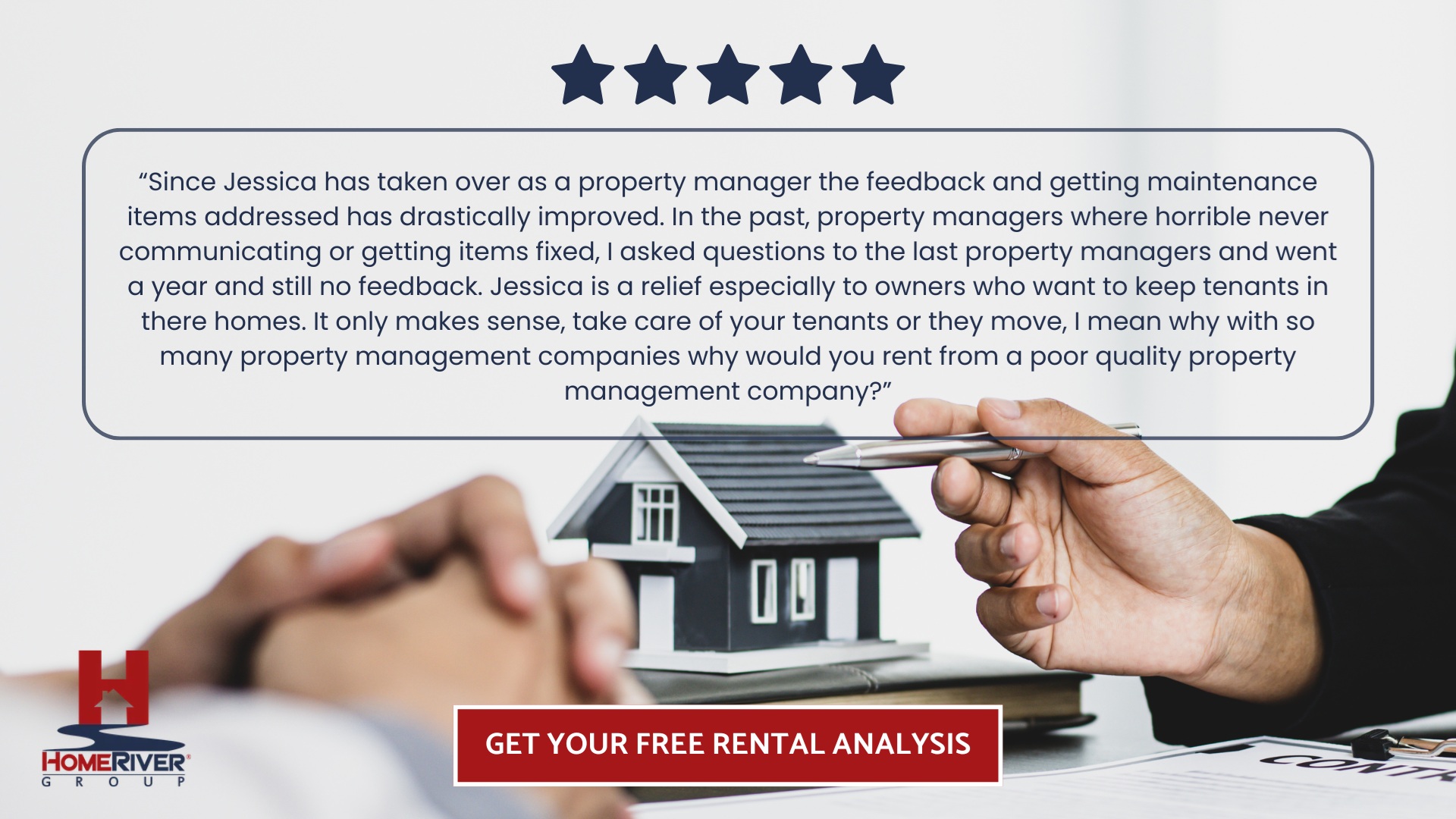
Are Property Management Fees Tax Deductible? A Guide To Maximizing Deductions
At HomeRiver Group, we understand the intricacies of property management and the importance of optimizing your returns. With our extensive multi-state footprint and a unified national platform, we pair dedicated local market expertise with centralized operations, asset management, and reporting capabilities to provide owners with the full range of property management services.
Property management fees, an integral part of property investment expenses, often raise questions for many owners. Specifically, the query, "Are property management fees tax deductible?" is a frequent concern among renters and buyers alike. Understanding this aspect of property management is crucial for maximizing your tax benefits and making informed decisions regarding your investment properties.
This article answers whether property management fees are tax deductible and guides you through maximizing your deductions.
Criteria For Tax Deductible Property Management Fees
Understanding which property management fees are tax deductible and the criteria for these deductions can significantly impact your financial planning and tax obligations. Given the complexity of tax laws, it’s crucial to discern which expenses can be legitimately deducted to maximize your property's profitability.
Here, we outline the necessary criteria that property management fees must meet to qualify as tax deductions:
Directly Related To Rental Activity
For property management fees to be tax deductible, they must be directly related to your property's rental activity. This means the fees should be ordinary and necessary expenses for managing, conserving, and maintaining your rental property. These fees can include costs associated with finding tenants, rent collection, maintenance management, and overseeing property repairs.
Ordinary And Necessary Expenses
The Internal Revenue Service (IRS) stipulates that deductible expenses must be ordinary and necessary. An ordinary expense is common and accepted in your trade or business. A necessary expense is helpful and appropriate for your business. Property management fees generally fit into this category, considering they are a standard expense for property owners who utilize management companies for their rental businesses.
Specified In The Agreement
Property management fees must be explicitly specified in the property management agreement to be deductible. The agreement should detail the services provided and the corresponding fees charged. This document serves as proof of the deductible expense should the IRS request documentation during an audit.
Not Capital Improvements
It's essential to distinguish between maintenance expenses and capital improvements. Only the former are immediately tax deductible. Capital improvements — expenses that add value to your property, prolong its life or adapt it to new uses — are not deductible as business expenses. Instead, these costs are capitalized and depreciated over several years. Property management fees related to routine maintenance and minor repairs are deductible; however, fees that conflate with capital improvements are not.
Proper Documentation
Lastly, maintaining precise records is paramount. Keep all receipts, invoices, and bank statements that detail your property management expenses. Proper documentation supports your deductions in the event of an IRS audit and helps you track your financial performance.
Calculating Your Property Management Expense Deduction
Property management costs, as operational expenses, are generally considered tax-deductible for property owners who rent out their properties. These fees can include costs associated with the day-to-day management of your rental property, such as tenant screening, property maintenance, and marketing vacancies.
To ensure you're maximizing your deductions, it's important to follow a structured approach:
Step 1: Collect All Receipts And Statements
First, gather all receipts and statements about your property management expenses over the tax year. HomeRiver Group ensures our clients have streamlined access to all necessary financial documentation through our centralized operations and asset management capabilities.
Step 2: Review Your Property Management Agreement
Examine your property management agreement closely to understand what is included in the fees. This can vary significantly depending on the services provided. Generally, standard property management fees, leasing fees, and renewal fees, when directly related to the management of your property, are deductible.
Step 3: Calculate The Total Amount Paid
Once you have a comprehensive understanding of the included services, total up the amount paid in property management fees for the year. This total serves as the baseline amount that you can potentially deduct.
Step 4: Consult With A Tax Professional
While these guidelines provide a framework for understanding how property management fees can be tax deductible, consulting with a tax professional is highly recommended. Tax codes can be complex and subject to change, and a professional can provide personalized advice based on your specific situation.
Common Misconceptions About Deducting Property Management Fees
Understanding the ins and outs of tax deductions is crucial for maximizing profitability in real estate investment. A frequent topic of inquiry and often misunderstood area is the deductibility of property management fees.
Here, we aim to clear up some of the common misconceptions surrounding these deductions:
Misconception 1: Property Management Fees Are Only Partially Deductible
One pervasive myth is that fees paid for property management services are only partially deductible. In reality, the IRS considers property management fees fully deductible operating expenses as long as they are ordinary and necessary in managing a rental property. This encompasses a wide range of services offered by property management companies like HomeRiver Group, from tenant screening and lease management to maintenance and repair coordination.
Misconception 2: Deductions Apply To All Types Of Properties
Another common misunderstanding is that the tax deductibility of property management fees applies to all types of properties an individual might own. It's critical to distinguish that these deductions are specifically relevant to rental properties used for business or investment purposes, not personal residences. This means that if you're leveraging the professional property management services of a company like HomeRiver Group for a rental investment, the fees are deductible. However, fees related to services for your home are not.
Misconception 3: Immediate Expense vs. Depreciation
Often, property owners are confused about whether property management fees should be considered an immediate expense or if they ought to be depreciated over time. The clear guideline from the IRS is that these fees should be treated as current business expenses. They do not fall into the capital expenditures that need to be depreciated. This misconception could lead to underutilizing the deductions you're entitled to in the present tax year.
Misconception 4: Only Direct Property Management Fees Are Deductible
Another area where misconceptions arise is the scope of deductible expenses. Some believe that only the direct fees charged for property management are deductible. However, the reality is broader. Any reasonable and necessary expense paid to a property management company to manage and maintain a rental property is potentially deductible. This includes but is not limited to, marketing expenses, tenant screening fees, and legal costs associated with lease preparations when a property management firm like HomeRiver Group renders these services.
Differences Between Residential And Commercial Property Management Deductions
When navigating property management fees and their tax implications, it's crucial to distinguish between residential and commercial properties, as the tax code treats these two categories differently.
Residential Property Management Deductions
For residential property owners, property management fees are ordinary and necessary expenses incurred in managing, conserving, and maintaining a rental property. This includes fees paid for HomeRiver Group's property management services, such as tenant placement, rent collection, property maintenance, and advertising. The IRS allows landlords to deduct these costs in full in the year they are incurred, offsetting rental income and reducing the total taxable income.
Commercial Property Management Deductions
Commercial property owners also benefit from deducting property management fees but with a broader scope due to the nature of commercial leasing and operations. In addition to the basic management services, commercial property owners might incur costs related to lease negotiations, property development management, and extensive tenant improvement projects. These costs, while also deductible, may be subject to different accounting treatments depending on their nature and timing. For example, some costs might need to be amortized over the life of the lease or capitalized and depreciated over time rather than deducted in full in the year paid.
Maximizing Deductions: The Do’s And Don’ts
Regarding tax deductions for property management fees, understanding what you can and cannot claim is vital to maximizing your benefits. Property owners, especially those who partner with comprehensive services like HomeRiver Group, can optimize their deductions significantly. However, there are specific guidelines to ensure compliance with the IRS
The Do’s
Do Itemize Your Deductions Properly: Ensure you itemize your property expenses accurately on your tax returns. Property management fees are deductible expenses because they are directly related to the maintenance and management of your rental property.
Do Maintain Meticulous Records: Documentation is key. Keep all invoices and receipts from your property management company, like HomeRiver Group, which details the services provided. This evidence is crucial for filing your taxes and in case of an IRS audit.
Do Understand What Encompasses Property Management Fees: Knowing what services are covered under property management fees can help you determine the full extent of your deductions. Property management fees typically include rent collection, tenant screening, maintenance call coordination, and property inspections—all services that HomeRiver Group excels at.
Do Consult With a Tax Professional: Tax laws frequently change, and having a professional guide you through your specific situation is invaluable. They can provide tailored advice on maximizing your deductions and staying compliant with the latest regulations.
The Don’ts
Don’t Forget to Report All Income: All rental income must be reported to offset your deductible expenses accurately. Omitting income can lead to penalties and audits, negating the benefits of your deductions.
Don’t Confuse Personal Expenses With Rental Property Expenses: Only expenses directly related to your rental property's operation, maintenance, and management are deductible. Personal expenses or unrelated property expenses cannot be legally claimed.
Don’t Overlook Depreciation: Depreciation is a significant deduction that can be claimed alongside your management fees. It accounts for the gradual wear and tear of the property over time but requires proper calculation and documentation.
Don’t Wait Until the Last Minute: Effective tax planning is an ongoing process that should be managed throughout the fiscal year, not just at tax time. Proactively managing your deductions can help avoid missed opportunities to maximize your tax benefits.
Final Thoughts
Understanding the nuances of tax deductions, particularly whether property management fees are tax-deductible, can significantly impact your financial strategy when navigating the complexities of property investment and management. As we've explored, these fees typically qualify as deductible expenses, offering investors a valuable opportunity to reduce their taxable income and maximize their return on investment. It's paramount, however, to maintain meticulous records and consult with tax professionals to ensure compliance and optimization of these deductions.
At HomeRiver Group, we underscore the importance of maximizing your investment returns while ensuring compliance with all regulatory requirements. Our national footprint, combined with our deep local market expertise, positions us uniquely to offer our clients exceptional service and insightful guidance on leveraging all potential tax advantages, including deductions on property management fees.
Remember, every dollar saved on taxes through smart deductions is a step toward maximizing the profitability of your investment.
Read also:
Frequently Asked Questions About Are Property Management Fees Tax Deductible
Which types of property allow the deduction of management fees?
Investment and rental properties typically allow for the deduction of property management fees. These fees can be considered an ordinary and necessary expense incurred in managing, conserving, or maintaining a property used to produce income.
Are property management fees fully tax-deductible?
Yes, for income-producing properties such as rental properties, property management fees are generally fully tax-deductible in the year they are incurred as they are considered operational expenses.
Can I deduct property management fees for a personal residence?
No, property management fees for personal residences where no part of the property is rented out or used for income-generating activities are not tax deductible.
Do management fee deductions vary by state?
While federal tax laws apply universally across the United States, some states may have different regulations or offer additional deductions or credits related to property management fees. It's advisable to consult with a tax professional familiar with your state's specific tax code.
Can I deduct fees for a property management company?
Yes, if you employ a property management company like HomeRiver Group to manage your investment or rental property, the fees paid to the company for day-to-day operations, tenant management, and maintenance services are tax deductible.
How do I report property management fees on my tax return?
Property management fees should be reported on Schedule E (Form 1040 or 1040-SR) as expenses incurred in operating your rental property. These fees are listed under the "expenses" section of the form.










